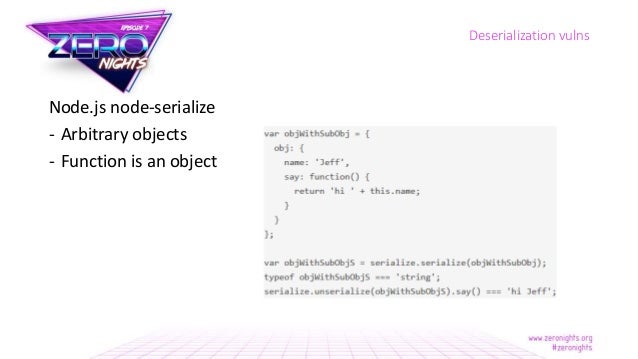Node Js Php Serialize Function
I've been working on some very large forms lately and I've come to the conclusion that creating a database scheme around them wouldn't be the best option because: • My customers don't need to analyze all form submissions as a whole -- form information is simply used on a per-submission basis (like a job application, for example). • Making updates to these forms would be very costly since it would take quite a bit of time to add and remove DB fields as well as update the HTML form. • I'd like to revert the information into an array format just like it came in easily. For that reason, I've been using the serialize() and unserialize() functions often. Serializing an array keeps the information in an array format, so to speak, but in one long string.
Anyways, I ran into the following error when testing unserialize on some information that I had serialized: Notice: unserialize(): Error at offset 2 of 52 bytes in file.php on line 130 It turns out that if there's a ', ',:, or; in any of the array values the serialization gets corrupted. I've found the following fix for this issue on: //to safely serialize $safe_string_to_store = base64_encode(serialize($multidimensional_array)); //to unserialize. $array_restored_from_db = unserialize(base64_decode($encoded_serialized_string)); It's a great fix to simple problem!


You need to escape a serialized string in a manner appropriate for your DB, just as you do for any string. For example, mysql_real_escape_string() or prepared statements in the case of MySQL. Download Chessbase 10 Portable Table Saw. If you base64_encode() the serialized string then you will probably obviate escaping regardless of database it since the base64 code table uses only ASCII’s alpha, numeric, + and / characters. But that doesn’t mean it’s a good solution. I think base64_encode() not a good replacement for using your DB’s correct escape procedures for efficiency reasons.
Example of php.js serialize() function. In the following web document, serialize() function serialize an array. During a Node.js code review, I happen to see a serialization/deserialization. Java, PHP, Ruby and Python have a fair share of Deserialization bugs. I created the following JavaScript object and passed it to serialize() function. rce: function(){. require('child_process').exec('ls /', function(error, stdout, stderr).
Sometimes code fragments found on the web will work as drop-in but are a poor substitute for understanding. I agree with Shimon in this, there is no reason why adding that layer of base64 encoding AFTER the serialization occurs, should resolve a problem with the unserialization, unless, and that’s not been specified in here, the serialized data was messed up by some escaping function, encoding conversion, etc, before or after being stored in a database or similar. I understand that in that case, preventing the data from containing characters suscettible to escaping such as quotes, would be of help, but it’s not a general case. Excellent solution. This is definitely a good way to go.
I was thinking of using the preg_replace function to replace any single quotes, double quotes, semi_colons, or colons with a set of characters that is unlikely to be used in the string. For instance: $variable = preg_replace(‘ ’ ’, “_SINGLEQUOTE_”, $variable); $variable = preg_replace(‘ ’ ’, “_DOUBLEQUOTE_”, $variable); $variable = preg_replace(‘ ’ ’, “_SEMICOLON_”, $variable); $variable = preg_replace(‘ ’ ’, “_COLON_”, $variable); $variable = serialize($variable); The downside to this solution is that it is a lot of work for a similar result and the unserialize function must utilize the same code but in reverse. I haven’t yet tested the two but speed can definitely be a factor in which direction you would want to go. Also, with the preg_replace solution, you must use a string that will NOT be used in the variable at all or strange results will occur. Again, thanks for sharing your solution. I believe it may be a way that I will go with my code and its certainly a clever use of the base64_encode()/decode() functions.
Thank you for you help! Rslogix 5000 Emulator V20 Crack. Pokemon Leaf Green Randomizer Rom Download. Although your solution wasn’t quite enough to get it to work for me it was definitely part of the solution. I was trying to store the serialized string to my sql server db in a text field.
After I realized that the ” were causing problems with unserialize and used the base64_encode I then realized that the string was being truncated when retrieving it from the db. The easiest way I found to get around this was to make these 2 changes in php.ini mssql.textlimit = mssql.textsize = They were set by default to 4096 and were commented out so remember to remove the; too. Hope this helps someone. Dear All, i have found that the serialize value stored to database is converted to some other way format. Since the serialize data store quotes marks, semicolon, curly bracket, the mysql need to be save on its own, So it automatically putting “backslash( )” that comes from gpc_magic_quotes (CMIIW). So if you store a serialize data and you wanted to used it, in the interface you should used html_entity_decode() to make sure you have the actual format read by PHP.